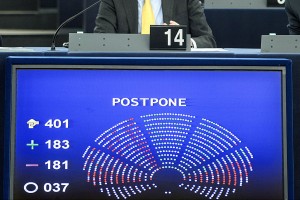TTIP: The European Parliament’s deadlock
Editorial 15 June 2015Despite calls from the G7 summit in which both President Obama and the Chancellor Merkel urged a fast conclusion of the negotiation, the European Parliament postponed the debate and the vote on the resolution on TTIP talks scheduled for the last Wednesday in Strasbourg.
While President Schulz’s decision to delay the vote has been publicly justified by the large number of amendments, behind the scene, political parties are still blaming each other for the postponement of the vote.
The draft recommendations, that should have been voted, were adopted by the INTA Committee the last May. In its entirety, the document reaffirms the need to create a comprehensive free-trade area, aimed at liberalise access market in trade and investments and to enhance the compatibility of regulatory regimes on the both sides of the Atlantic. At the same time, the text calls for a balanced approach by enhancing transparency and putting the wellbeing of ordinary citizens, workers and consumers as a benchmark for the trade agreement. To do so, the dossier suggests to identify regulatory measures that can’t be compromised and to define areas where a mutual approach is needed in order to secure high standards.
Probably due to a failure to reach a transversal compromise between the two biggest political parties, namely EPP and S&D, this last-minute decision shows how controversial is the Transatlantic Trade and Investment Partnership for Europe.
In particular, concerns have been expressed on the ISDS clauses (Investor-State Dispute Settlement), that allows corporations to sue governments in international arbitration tribunals, bypassing national courts.
Political parties have discussed for months in order to find an agreement on this issue, but divisions still exist, especially amid S&D party. Given these premises, even if a fragile deal has been reached in INTA Committee, the vote in Plenary risked political forces to reject the whole text, if an anti-ISDS amendment had been adopted.
Although not binding at this stage, the Parliament approval was supposed to give a contribute to define a new path for negotiations. Thus, as the EP’s President Schulz said, by failing on the text adoption the European Parliament would weaken its power on one of its key prerogatives.
Now that the resolution has been sent back to the INTA Committee is unlikely that the next Plenary will vote on TTIP’s negotiation the next month. Maybe the vote could be expected in September.
Margherita Genua
Editor – NEU



